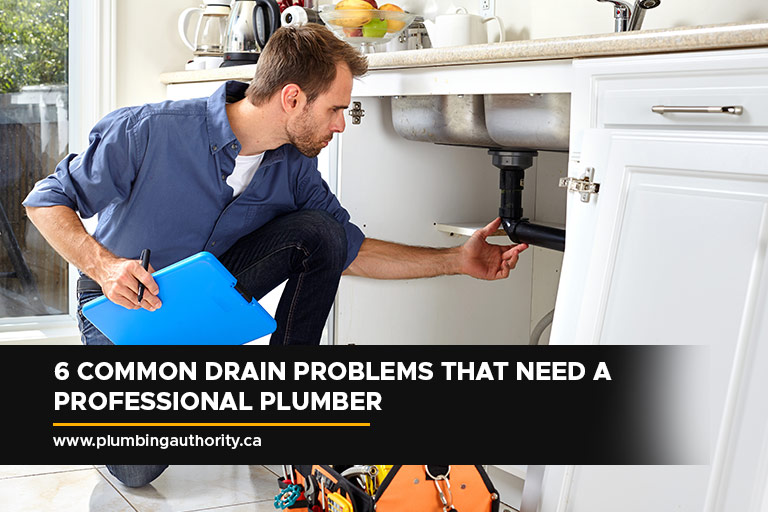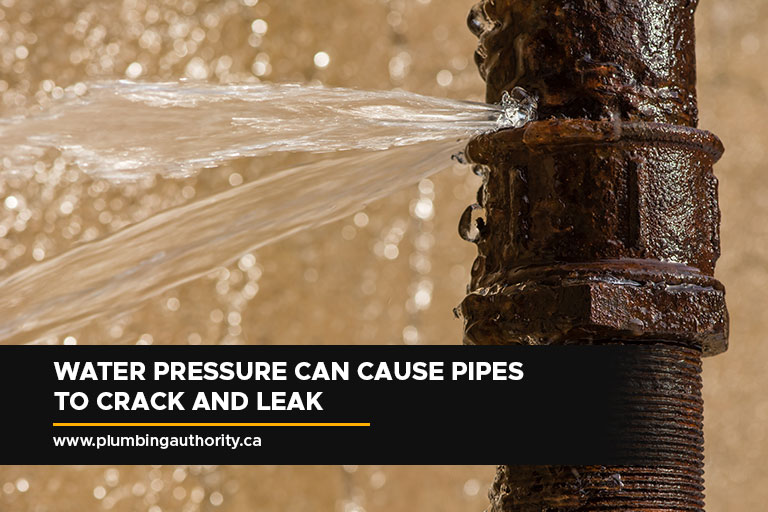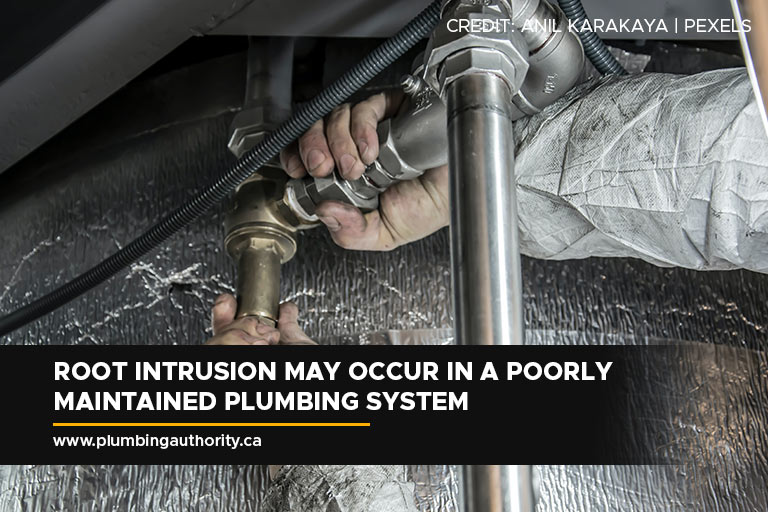
While a plunger can often clear minor clogs, drainage issues may indicate a more serious problem that usually requires professional drain service in Caledon.
Drain issues are a common problem for many homeowners. From slow drains to clogs, these problems can be aggravating and inconvenient. Knowing the most common types of drain problems and when to call a professional can assist you in keeping your drains functional and avoiding more serious problems. Here are the most common types of drain problems and their causes, which may require immediate help from a professional:
1. Slow Drains
Slow drains refer to pipes or plumbing fixtures that allow water to flow at a reduced rate. This can cause water to back up, leading to clogs, foul odours, and other problems.
Causes of Slow Drains
- Hair, soap scum, and grease buildup – These household items can accumulate in pipes and form clogs that reduce water flow.
- Debris buildup – Foreign objects such as wipes, sanitary products, and food waste can accumulate in pipes and cause clogs.
- Corrosion and wear – Over time, pipes can corrode or wear, reducing the diameter of the pipe and causing water to flow more slowly.
When diagnosing and repairing slow drains, it’s wise to call a professional drainage service provider. Certified plumbers have specialized drain cleaning tools, equipment, and expertise to safely and efficiently restore proper water flow and prevent further damage to pipes and plumbing fixtures. Plumbers may also employ video inspections, hydro-jetting, and other techniques to clear clogs and restore proper water flow.
2. Leaky Pipes

Water pressure can cause pipes to crack and leak
Leaks can range from minor drips to significant floods and can cause many problems, including water damage, mould growth, and increased water bills.
Causes of leaky pipes
- Age – Over time, pipes can corrode, wear, and become brittle, making them more susceptible to leaks.
- Poor installation – Poor installation of pipes can lead to leaks and damage from settling, shifting, or earthquakes.
- Freeze damage – During cold weather, pipes can freeze and expand, causing cracks or breaks that can lead to leaks.
- High water pressure – Pipes that are under too much pressure can burst.
Do not attempt a DIY fix for leaky pipes to avoid worsening the problem and potentially causing more damage to your pipes. Drainage experts can repair the leak and identify and address the underlying causes to prevent future problems. This can save you time and money in the long run and ensure your drainage system’s longevity.
Some leaky pipe repairs may also require permits or inspections from local building departments. Drainage experts are familiar with these regulations. They can ensure that the work is completed in accordance with all applicable laws and codes.
3. Open Joints
Open joints refer to the spaces or gaps between pipes or plumbing fixtures where water can escape.
Causes of open joints
- Shrinkage – Shrinkage is natural as concrete or wood dries and loses moisture. As the materials shrink, they can pull away from each other, leaving a gap or joint.
- Settlement – Settlement can occur when the ground beneath a building shifts or settles due to changes in soil moisture, compression, or other factors. This can cause building components to move, resulting in gaps between joints.
- Structural deflection – Structural deflection can occur when a building’s components are subjected to heavy loads, such as wind, snow, or earthquakes. This can cause the components to deflect or bend, resulting in gaps or open joints.
- Poor construction techniques – Poor construction techniques, such as inadequate reinforcement or inferior materials, can result in gaps or open joints. For example, if a building is not properly anchored to its foundation, the components can shift and separate, leading to loose joints.
An experienced drain specialist can diagnose and repair open joints accurately. They have the tools and knowledge to safely and efficiently fix the problem and prevent further damage to pipes and the surrounding area.
4. Recurring Clogged Drains
Recurring clogged drains refer to drains that are frequently blocked, leading to slow-moving or backed-up water. This can be a significant inconvenience and lead to water damage if left unaddressed.
Causes of recurring clogged drains
- The build-up of hair, soap scum, and grease – These substances accumulate in pipes and cause blockages.
- Tree roots – Tree roots can penetrate pipes and cause blockages that prevent water from flowing freely.
- Misuse of drains – Flushing inappropriate items, such as sanitary pads, baby wipes, or cooking oil, down drains can lead to blockages.
Professional plumbers have proper training in identifying and repairing potential safety hazards, such as gas leaks or water damage. If open joints are causing a safety issue, a professional plumber will be able to address it quickly and effectively. Professional plumbers can access the equipment and tools necessary to repair open joints. This includes specialized tools and materials that may not be available to homeowners, such as epoxy resins and silicone sealants.
5. Root Intrusion

Root intrusion may occur in a poorly maintained plumbing system
Root intrusion occurs when tree roots grow towards a source of moisture, such as a sewer line. This can lead to increased maintenance costs as frequent repairs and cleaning are needed to keep the system functioning properly. Moreover, roots can restrict water and sewage flow through the pipes, reducing the system’s capacity and causing backups and slow drains.
Causes of root intrusion
- Poorly maintained pipes – Old or poorly maintained pipes are more susceptible to root intrusion, as they are more likely to have cracks, joints, and other areas where roots can penetrate.
- Location of pipes – The location of pipes near trees and other vegetation can increase the risk of root intrusion.
- Soil type – Soils rich in nutrients and moisture can encourage root growth, increasing the risk of root intrusion.
- Climate – A warm, moist climate can encourage root growth, leading to root intrusion into pipes.
- Lack of maintenance – Neglecting regular inspections and maintenance of the drainage system can increase the risk of root intrusion, as blockages and other issues can go unnoticed.
To resolve root intrusion problems, keep trees and other vegetation away from the drainage system and inspect and clean the system periodically. If you suspect a root intrusion, contact a professional plumber to diagnose and repair the problem.
6. Cracked Sewer Pipe
A cracked sewer pipe is a common problem that occurs when a sewer pipe cracks or breaks, allowing waste and sewage to leak into the surrounding soil. This can cause various issues, including unpleasant odours, property damage, and potential health hazards.
Causes of cracked sewer pipes
- Age and wear and tear – Sewer pipes can become weakened and brittle over time, increasing the risk of cracks and breaks.
- Soil shifting – Soil shifting due to changes in temperature, moisture levels, and other factors can cause sewer pipes to move and crack.
- Improper installation – Improper installation of sewer pipes using faulty materials with poor workmanship can increase the risk of cracks and breaks.
- Extreme weather – Extreme weather conditions, such as heavy rain or freeze-thaw cycles, can cause damage to sewer pipes.
Drain specialists can use techniques, such as trenchless sewer repair, to repair the cracked pipe without digging up the entire sewer line.
Ignoring drain problems can cause them to worsen, potentially requiring more extensive and costly repairs. By addressing drain problems as soon as they arise, you can avoid more serious issues and keep your home safe, clean, and comfortable.
You can effectively diagnose and repair the problem by hiring a professional drain specialist. They can help you prevent further damage to your property due to their background and experience with drainage issues. They can also perform techniques for cleaning sink drains and unclogging shower drains, such as trenchless sewer line repair and hydro jetting.
Do you need a professional for emergency drain service? Protect your pipes to increase their lifespan. Keep your drainage system in good shape. Contact Plumbing Authority at 647-992-7473.




